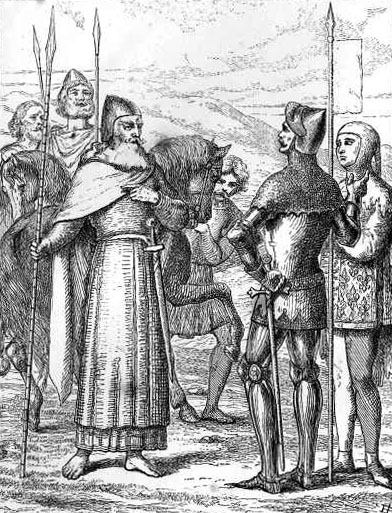Art MacMurrough (2)
In 1399 King Richard paid another visit to Ireland. His exactions and oppressions had made him very unpopular in England, and it is probable that this expedition was planned to divert the minds of his subjects. If this was his object, it failed signally; for the unfortunate monarch was deposed by Parliament the same year, and was obliged to perform the act of abdication with the best grace he could. His unhappy end belongs to English history. Richard again landed in state at Waterford, and soon after marched against the indomitable MacMurrough. His main object, indeed, appears to have been the subjugation of this "rebel," who contrived to keep the English settlers in continual alarm.
A French chronicler again attended the court, and narrated its proceedings. He describes MacMurrough's stronghold in the woods, and says that they did not seem much appalled at the sight of the English army. A special notice is given of the chieftain's horse, which was worth 400 cows.[1] The chieftain's uncle and some others had made an abject submission to the English monarch, who naturally hoped that MacMurrough would follow their example. He, therefore, despatched an embassy to him, to repair the "wrongs " which he had inflicted on the settlers, for which he demanded reparation. The Leinster king, however, could neither be frightened nor persuaded into seeing matters in that light, and, probably, thought the term rebel would be more appropriately applied to those who resisted the native rulers of the country. He declared that for all the gold in the world he would not submit.

Interview between MacMurrough and the Officers of Richard the Second
Richard's army was on the verge of starvation, so he was obliged to break up his camp, and march to Dublin. Upon his arrival there, MacMurrough made overtures for peace, which were gladly accepted, and the Earl of Gloucester proceeded at once to arrange terms with him. But no reconciliation could be effected, as both parties refused to yield. When Richard heard the result, "he flew into a violent passion, and swore by St. Edward he would not leave Ireland until he had MacMurrough in his hands, dead or alive." How little he imagined, when uttering the mighty boast, that his own fate was even then sealed! Had he but the grace to have conciliated instead of threatened, a brave and loyal band of Irish chieftains would soon have surrounded him, and the next chapter of English history would have been less tragic. Disastrous accounts soon reached him from England, which at once annihilated his schemes of Irish conquest or revenge. His own people were up in arms, and the prescriptive right to grumble, which an Englishman is supposed to enjoy par excellence, had broken out into overt acts of violence. War was inaugurated between York and Lancaster, and for years England was deluged with blood.
Notes
[1] Cows.—"Un cheval ot sans sele ne arcon, Qui lui avint consté, ce disoit-on, Quatre cens vaches, taut estoil bel et bon."
